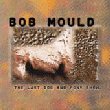|
|

Bob Mould It's a sunny morning in North Cambridge, and even my postmaster feels the need to comment on my chipper mood: "In all the time you've come to this post office, this is the first time I've seen you smile." And why not? The sun is shining, the birds are singing, and the yellow ticket he holds in his hand will most likely be redeemed for a copy of the latest Bob Mould album, The Last Dog and Pony Show. Indeed it is, and when I withdraw a copy of this coveted disc from the envelope, I feel like dancing down the street and grinning big and silly at passerby. To the casual observer, my happiness at a new release by a legendarily dour pop stalwart like Mould might seem a bit surprising. This is, after all, the latest album by a songwriter whose lyrical subject matter has included such party favourites as fetishistic sex and marital infidelity; intoxicating, obsessive love; the suffocation and hypocrisy that has become a fact of life in organized religion; and a gripping eyewitness account of watching a man drown his girlfriend. Unusual as it might seem, Mould's dark view of the world, combined with his concise, chiming melodies, Townshendian crescendos, and crunching power chords, inspire catharsis in this most idealistic of young writers. A quick spin through Mould's first release with the power trio Sugar might put that view into perspective, for Copper Blue makes for an exhilarating and finally optimistic listen; the way the music and lyrics portrayed a person in an emotionally claustrophobic situation struggling to get out shook me down to my soul when I was fifteen, and still causes a jolt of recognition at my jaded age of twenty-one. Dog and Pony's universal approach (compared to Mould's self-titled 1996 release) sets itself up as an album to follow in the cathartic footsteps of Copper Blue. At the same time, it practically comes with the caveat "enjoy this while it lasts" stamped to its forehead, since as every music freak and their Aunt Sally must know, Mould intends on hanging up the electric guitar after this album to avoid self-parody and start focusing on more sonically intriguing and artistically rewarding projects. Musically, _Dog and Pony_ makes for an intriguing listen. For almost a year and a half before the album's release, Mould toured the country performing the songs that comprise the album. After hearing such zygotes of songs in various stages of formation, finally listening to the complete songs offers some good insight into Mould's songwriting process. With the actual songs that comprise the album, the rule of thumb is: if you like Mould's previous creative output, you will most certainly enjoy this album. Everything I as a fan enjoy about his music is here in spades for all to hear, from the high drama building within the recorded version of live favourite New #1 (which features able cello work from Alison Chesley of Verbow, whose arrangement interweaves with Mould's guitar playing in a delicate musical tapestry) to the chiming power chords of Moving Trucks and Taking Everything, whose spirited delivery reveals the influence of Cheap Trick on the veteran singer/songwriter. Likewise, Dog and Pony brings some elements of experimentation into an album of songs mostly following Mould's traditional style. A stunningly awful Megamanic allows Mould to seemingly parody trip-hop, a genre of which he has become something of a fan. To a lesser extent, First Drag of the Day brings a roller-rink organ into the standard arrangement of guitar/bass/drums, and its tarnished dulcet tones offset Mould's serrated guitar lines to powerful effect. Somehow, however, I can't help but feel implicated by the lyrics to this album. Dog and Pony's lines deal brutally with an unhappy creative partnership where the other half could be anything from writer's block to Mould's former songwriting partner Grant Hart, whose addiction to heroin may have been the catalyst for Skintrade. For me, this album is reminiscent of a relationship with a boy whose attention I craved, won, and then questioned; I can hear a claustrophobia similar to that which existed within the apartment we shared within the tightly-drawn words of the album, and the bons mots Mould throws at this unnamed adversary must reflect what my dear friend was thinking while I was taking my histronic drama-queen depression out on him. Granted, it's hard for even the most casual listener to bristle at lines like "you turned around to help someone/and then I helped myself" or "too much to ask for but I want what I deserve", but given their context within my own life, I feel pressed against the wall with the strain of what a bad person I was building up within Mould and breathing down my neck with a hot, heavy breath. I don't know how much of this very personal experience will affect you, the potential listener - to quote music critic Jim Miller, rock 'n' roll works as both common experience and private obsession, but I don't know how much the latter of mine is important enough to you to warrant a listen to this album. So, to get tie this into my review of The Last Dog and Pony Show. Musically the album is a stunner for me; though it's of a piece with Mould's other creations, if you're a fan of his terse, hooky brand of rage pop, you'll likely feel the same. You may even feel moved on a deep emotional level, as was I - if I ever need another reminder of why the other side offers such an important perspective, I just need to pop this one in the ole player, when the thought of Mould standing that close to me will frighten me into perspective. Enjoy. Copyright © 1998 Chelsea
|
| You may also want to check out our Bob Mould articles/reviews: Beauty & Ruin, Patch The Sky. |
| © 2011 Luna Kafé |